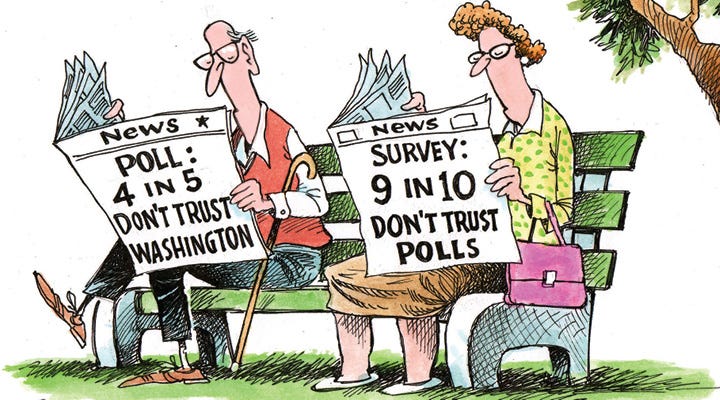Polls can be extremely misleading... and dangerous to democracy.
This is an important TAT for voters to understand, especially that we are already being bombarded with election news. What prompted this article was a REUTERS article regarding what I believe to be a key factor in misunderstanding polling. My longtime experience in wielding influence to support US national security, until I retired from the US Army in 2015, is what gives me the insight to offer to all of you. This includes my current position as the VP at Narrative Strategies, a US Think and Do Tank specializing in the core of all influence, narrative.
Today I will use an article from one of my top 4 media outlets, Reuters, to make my point. Along the way you will also hear some disparaging words about the US national security community’s failure to also understand the point of this article and which has left us critically vulnerable to adversarial influence for approximately forty years.
The REUTERS article titled: About half of US Republicans could spurn Trump if he is convicted, Reuters/Ipsos poll shows, is at the heart of this TAT piece. "WASHINGTON, Aug 3 (Reuters) - About half of Republicans would not vote for Donald Trump if he were convicted of a felony, a sign of the severe risks his legal problems pose for his 2024 U.S. presidential bid, according to a Reuters/Ipsos poll that closed on Thursday." - REUTERS - By Jason Lange - August 3, 2023
I wish to make it clear that this excellent reporter did nothing wrong and as always, wrote an excellent article based on the prevailing knowledge, people in the polling industry consider. The problem is, prevailing polling understanding, does not take narrative into account. No, not the common interpretation of narrative as a kind of story, but what true narrative means.
Also, for the record, the US national security community refuses to understand narrative as well and continues to fail, as they have for approximately four decades in protecting the US from adversarial foreign and domestic influence. This is the single most critical vulnerability in US national security. Even our most prestigious organizations that write and publish national defense doctrine, fail miserably to get it. It was precisely this vulnerability that allowed Putin to sway our 2016 election without any serious push-back.
Within the past few months alone, the national security community has published at least two new products that horribly butcher our understanding of the role of influence in national security and have now codified this misunderstanding into doctrine. The third is from RAND Corporation that often advises on this doctrine. Their understanding is not substantially better. These three products are:
JP 0-04 Military doctrine on how to operate with influence, ridiculously titled, IA or Information Assurance. WTH?!
“Strategy for Operations in the Information Environment” which apparently supposed to simplify our inability to operate as a unified defense in the critical role of influence.
The research report from RAND Corporation, a prime US Think Tank on public policy and defense and which I believe far off-track in their understanding and applicability of narrative.
Don’t get me wrong, I am a big fan of RAND and their work, but even high-level experts go far off-track sometimes. In my professional opinion, their narrative paper, is one such time.
Now… back to the polling discussion
American politics have become a disaster of coverage, predictions, polling, influence operations and more. To make sense of it all requires far more than just crunching numbers.
What number-crunching misses is how humans, “make meaning” out of all they experience throughout their lifetimes, based on a variety of factors. In fact, we all have countless layers to our own identity. Families, groups, movements, political parties and most nations share many layers of identity. Understanding those identities is realm of narrative or the phenomena of how humans make meaning. Narrative is not a just what most folks believe to be a story, it’s far more. When there is any type of conflict, it is actually called Narrative Warfare or NW. This means competing perspectives based on group identities.
For those who understand NW and how to analyze for NI/ narrative identity, predictability increases dramatically. I know that all of this sounds deep or foreboding but please follow along a little longer.
Knowing an identity well works the same as when you know exactly what to say or do to a spouse, sibling, close family member, dear friend etc. to make them respond in a specific way. We all know how to do this because we all have someone that we know how to predictably trigger, good or bad. This is the advantage that NW experts have over everyone else.
As it pertains to today’s article, polling suggesting that half of Republican voters won’t vote for Trump after the multiple indictments, flies in the face of what narrative analysis tells us. There are really only two ways to understand the identity of a person, or a group. You either know how to analyze for the answers or you build the identity via influence operations.
In the case of today’s version of the GOP, FOX has been shaping and conditioning the identity of the party over nearly thirty years. This means that with a high degree of predictability, they know what to say or do, to get a predictable response. In other words, FOX and their ilk, have what is known as reflexive control over their Pavlovian audience. In simple terms, they can pretty much control their actions, beliefs and more.
The polling at the beginning of the article does not take into account just how much control the GOP has over their voters. Trump, in 2020 received more votes than he did in 2016 after 4 years of lies, corruption, the death of hundreds of thousands of Americans due to his COVID lies and even after he attempted an armed coup against the United States. This is the power of identity on actions. Interpreting identity does not figure into any polling that I am aware of.
As someone who is in a constant battle to have the national security community understand that there is far more to influence than technology, and number-crunching, I know exactly how dangerous it is to operate with hubris mixed with a failure to adapt. Yes, most reputable pollsters do their best but still and as we all have seen in the Trump era, polling has made some truly tragic mistakes.
The voting public rarely understands the mechanics of polling or any other target audience analysis. They look at the numbers to see who is ahead… period. In order to improve polling and hence, voter confidence, we need to begin looking deeper and explaining to voters some of the nuances discussed today.
I would hope that we improve voter education faster than the national security community says they are fixing my profession. Actually, a snail racing an old, three-legged tortoise would be light years faster.
All my best for everyone’s “hump day.”
Paul








Paul,
Again another thoughtful article. Your points are well taken on the fallibility of polling data. If the pollsters had been correct in 2016 we would now be more than halfway through Hillary Clinton's second term in office.
Your concerns about the NATSEC community making a hash of narrative and strategic influence are well founded. I have my own tales to tell on this topic but since I don't want a visit by the FBI I will refrain from comment. Suffice it to say that this latest serving of bureaucratic Bouillabaisse reminds me of the axiom that the best way to kill a good idea is to take it to a meeting.